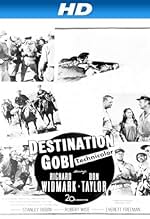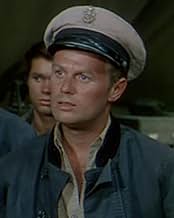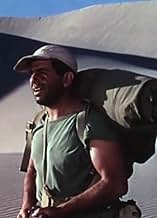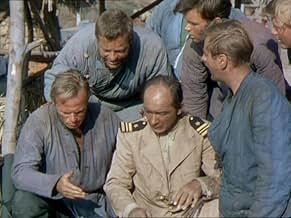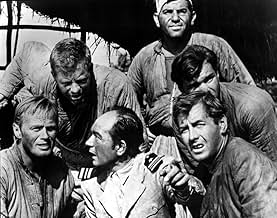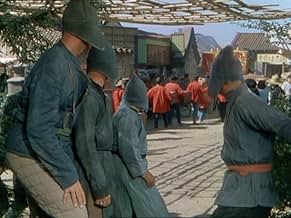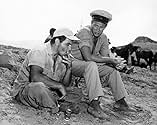IMDb RATING
6.3/10
1.2K
YOUR RATING
In 1944, US Navy specialists run a weather station in the Gobi desert where they are harassed by Japanese warplanes but aided by local Mongol nomads.In 1944, US Navy specialists run a weather station in the Gobi desert where they are harassed by Japanese warplanes but aided by local Mongol nomads.In 1944, US Navy specialists run a weather station in the Gobi desert where they are harassed by Japanese warplanes but aided by local Mongol nomads.
Max Showalter
- Walter Landers
- (as Casey Adams)
Edgar Barrier
- Yin Tang
- (uncredited)
Willis Bouchey
- Capt. Gates
- (uncredited)
James Conaty
- Admiral
- (uncredited)
Franklyn Farnum
- Quartermaster General
- (uncredited)
John Hedloe
- Pilot
- (uncredited)
Earl Holliman
- Frank Swenson
- (uncredited)
Frank Iwanaga
- Lieutenant
- (uncredited)
Featured reviews
The title suggests something more rugged. But for once they weren't joking when the opening crawl declared this "one of the strangest stories of World War II" (although they probably were when they cast Mervyn Vye as the leader of "the First Mongolian Cavalry". While another of the locals is a kleptomaniac nicknamed 'Harpo' who like his namesake communicates through mime).
The tale of "a bunch of weathermen chasing balloons" across Inner Mongolia, the most arduous part of shooting Robert Wise's first colour film was probably lugging the enormous Technicolor camera about; which paradoxically makes it incongruously pretty to contemplate.
The tale of "a bunch of weathermen chasing balloons" across Inner Mongolia, the most arduous part of shooting Robert Wise's first colour film was probably lugging the enormous Technicolor camera about; which paradoxically makes it incongruously pretty to contemplate.
Destination Gobi finds Richard Widmark assigned as the ranking non-commissioned officer on a Navy weather station in the Gobi Desert. Wrap your mind around that concept, Navy personnel in the middle of the Gobi Desert.
It's not an assignment that a guy who was a CPO on the USS Enterprise in 1944 is looking for. But that's what he's drawn. Widmark is to assist Captain Russell Collins in setting up one of a series of weather station in Inner Mongolia, that is that part of Mongolia located inside the Great Wall of China.
Collins is a meteorologist with a Navy commission, so Widmark is really the guy in charge. Setting up the advance outpost, the dozen or so sailors have to establish good relations with the local Mongol tribesmen who pretty much live as they did under Genghis Khan. The gifts that put it over are a requisition for some old army saddles from the late U.S. Cavalry.
Later on the Japanese bomb the station and Collins and others are killed. It's up to Widmark to get his men out of the Gobi Desert and avoid falling into the hands of the Japanese. The Mongols and their saddles prove to be of invaluable assistance.
I think Destination Gobi got a bit off track after the Japanese attack. The first part of the film was quite good, especially depicting the Mongol culture. But after the attack the escapades of the men trying to get to U.S. lines which in this case means to Eastern China and across the water to Okinawa was a bit much. The Japanese were shown to be as dumb as the Axis powers were shown during World War II and the height of the propaganda films made back then. Richard Loo who played so many nasty Japanese back in the day was the Japanese commander and he must have had a recurring case of deja vu.
Still Widmark does a fine job as does Murvyn Vye who is the head Mongol. They are ably supported by such stalwart character players as Don Taylor, Martin Milner, Casey Adams, Darryl Hickman, and Earl Holliman.
Destination Gobi could have been a much better film.
It's not an assignment that a guy who was a CPO on the USS Enterprise in 1944 is looking for. But that's what he's drawn. Widmark is to assist Captain Russell Collins in setting up one of a series of weather station in Inner Mongolia, that is that part of Mongolia located inside the Great Wall of China.
Collins is a meteorologist with a Navy commission, so Widmark is really the guy in charge. Setting up the advance outpost, the dozen or so sailors have to establish good relations with the local Mongol tribesmen who pretty much live as they did under Genghis Khan. The gifts that put it over are a requisition for some old army saddles from the late U.S. Cavalry.
Later on the Japanese bomb the station and Collins and others are killed. It's up to Widmark to get his men out of the Gobi Desert and avoid falling into the hands of the Japanese. The Mongols and their saddles prove to be of invaluable assistance.
I think Destination Gobi got a bit off track after the Japanese attack. The first part of the film was quite good, especially depicting the Mongol culture. But after the attack the escapades of the men trying to get to U.S. lines which in this case means to Eastern China and across the water to Okinawa was a bit much. The Japanese were shown to be as dumb as the Axis powers were shown during World War II and the height of the propaganda films made back then. Richard Loo who played so many nasty Japanese back in the day was the Japanese commander and he must have had a recurring case of deja vu.
Still Widmark does a fine job as does Murvyn Vye who is the head Mongol. They are ably supported by such stalwart character players as Don Taylor, Martin Milner, Casey Adams, Darryl Hickman, and Earl Holliman.
Destination Gobi could have been a much better film.
I saw this movie on television years ago. Thankfully it was filmed in color, which only serves to enhance the appearance of the Mongol culture depicted in the film. Richard Widmark is always fun to watch and watching the two opposite cultures Mongol and Navy try to deal with each other was interesting. The story was unusual although mostly factual and would like to see it again, even purchase it. It manages to keep your attention mostly without explosions and chaos typical of a wartime environment. Good movie!
This film has the feel of a documentary as sailor Richard Widmark frets at his role at a remote weather station in the Gobi Desert and yearns to get a ship under him again. Ultimately, he returns to the sea in an unexpected fashion.
The relationship between the sailors and the nomadic Mongols is a crucial part of the film. The nomads are credibly portrayed as human beings who are neither all good or all bad. The film gets high marks for its portrayal of the Mongol culture. It would have been so easy for the film to show people who looked like the Native American Indians Hollywood films are so comfortable with. The Mongol yurts have a realistic look and the film truly succeeds here in portraying a different and likeable culture.
There is little action in this film, but that's really not a problem. The unusual and probably unique story line more than makes up for it. The ending is a little hard to believe, but remember that anything is possible in films. Enjoy it.
The relationship between the sailors and the nomadic Mongols is a crucial part of the film. The nomads are credibly portrayed as human beings who are neither all good or all bad. The film gets high marks for its portrayal of the Mongol culture. It would have been so easy for the film to show people who looked like the Native American Indians Hollywood films are so comfortable with. The Mongol yurts have a realistic look and the film truly succeeds here in portraying a different and likeable culture.
There is little action in this film, but that's really not a problem. The unusual and probably unique story line more than makes up for it. The ending is a little hard to believe, but remember that anything is possible in films. Enjoy it.
I saw Destination Gobi in 1953. I looked for a copy of the movie for years until I was able to get it on DVD. I have watched this movie several times since, and enjoy each viewing.
I differ from some of the more critical reviews. Too often the reviews come off as the "want-to- be movie critics", who seem to nitpick this and that. They fail to recognize that some movies are meant for just entertainment. Destination Gobi falls into this category. It wasn't meant to become Movie of the Year, nor to compete with Gone With the Wind.
I have most of the war movies made in my DVD library. World War II created many Hollywood opportunities in creating movies, along with governmental approval to boost patriotism. And, Hollywood produced many, some great, others poor. Movie goers liked some, disliked others. It's just a matter of one's own personal view of what they're looking for in a film. If it's for their desire to have an opportunity to become a pseudo-movie critic, then so be it. I watch movies for entertainment
I differ from some of the more critical reviews. Too often the reviews come off as the "want-to- be movie critics", who seem to nitpick this and that. They fail to recognize that some movies are meant for just entertainment. Destination Gobi falls into this category. It wasn't meant to become Movie of the Year, nor to compete with Gone With the Wind.
I have most of the war movies made in my DVD library. World War II created many Hollywood opportunities in creating movies, along with governmental approval to boost patriotism. And, Hollywood produced many, some great, others poor. Movie goers liked some, disliked others. It's just a matter of one's own personal view of what they're looking for in a film. If it's for their desire to have an opportunity to become a pseudo-movie critic, then so be it. I watch movies for entertainment
Did you know
- TriviaNixon and Fallon, NV were both used as location sites, and Paiute Indians residing on a reservation in Nixon played Mongol extras.
- GoofsMcHale claims that "Gobi Desert" means "wall of spears." Actually, "Gobi" is the Mongolian word for "desert."
- Quotes
[Walter flirts successfully with a Mongolian woman]
Jenkins: Well, looks like you made a hit, Walter my boy. Tell me, how do you do it?
Walter Landers: My training as a meterorologist. I can take one look at a girl and tell weather.
- Crazy creditsOpening credits prologue: In the Navy records in Washington, there is an obscure entry reading "Saddles for Gobi."
This film is based on the story behind that entry--one of the strangest stories of World War II.
- ConnectionsEdited into All This and World War II (1976)
- How long is Destination Gobi?Powered by Alexa
Details
Box office
- Budget
- $1,340,000 (estimated)
- Runtime
- 1h 30m(90 min)
- Color
- Aspect ratio
- 1.37 : 1
Contribute to this page
Suggest an edit or add missing content


